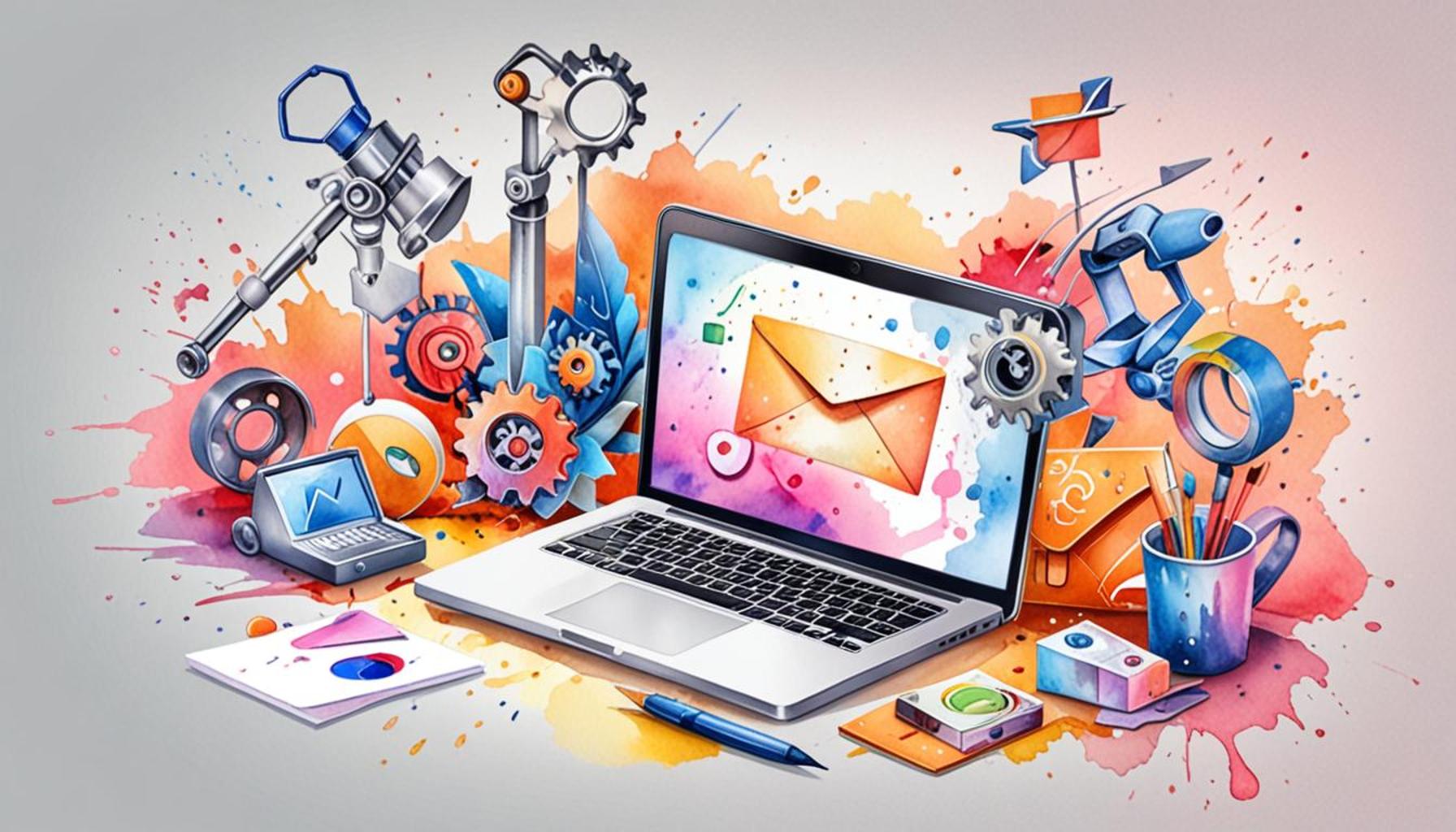How Automation Tools Are Transforming Email Marketing

Revolutionizing Communication
In today’s fast-paced digital landscape, businesses must adapt swiftly to stay relevant. Email marketing remains a powerful tool for reaching customers, and automation is key to maximizing its potential. Automation tools are not merely trends; they are essential components reshaping how brands communicate with their audiences.
What Are Automation Tools?
Automation tools streamline and enhance email marketing efforts by helping businesses connect with their customers more effectively. These tools facilitate several crucial functions that can transform the way brands interact with their audience:
- Personalizing customer interactions: Automation allows businesses to tailor emails based on customer behavior and preferences. For example, by analyzing past purchase history, companies can send personalized product recommendations, making the customer feel valued and more likely to engage.
- Segmenting audiences for targeted messaging: Effective segmentation is critical for delivering the right message to the right audience. Automation tools enable marketers to categorize their lists based on demographics, interests, and purchasing behavior, leading to more relevant content. A local bakery, for instance, might send special deals to customers who live nearby while promoting delivery services to those farther away.
- Timing emails for optimal engagement: Knowing when to send an email can significantly impact open rates. Automation tools can analyze customer data to determine the best times to reach specific segments, ensuring that messages land in inboxes exactly when recipients are most likely to read them.
- Analyzing campaign performance and insights: Leveraging automation provides valuable analytics on how each campaign performs. Marketers can view open rates, click-through rates, and conversion metrics in real time, allowing them to optimize future emails for better results.
These features lead to more effective campaigns, ultimately boosting conversion rates and fostering customer loyalty. The efficiency of automation also contributes to reduced workload, allowing marketing teams to focus on strategic decisions rather than mundane tasks.
Impact on Businesses
As companies in the United States embrace automation, they uncover various benefits that can propel them ahead of the competition:
- Increased efficiency and resource savings: Automation eliminates repetitive tasks such as manual list management and follow-ups, freeing up valuable time and energy for creative strategy and problem-solving, which are paramount in gaining competitive advantage.
- Enhanced customer experience through timely communication: Automation allows brands to engage with their customers at critical moments, such as sending a welcome message immediately after signup or a follow-up email after a purchase. Such timely interactions can significantly enhance customer satisfaction and retention.
- Greater return on investment with optimized strategies: Automation leads to streamlined processes and a decrease in marketing costs. According to a report by Market Research Future, the marketing automation industry is expected to grow significantly, indicating that organizations are recognizing the potential for improved ROI.
Understanding the transformation wrought by these tools is crucial for marketers aiming to sharpen their competitive edge. The prevalence of automation tools highlights a fundamental shift in marketing practices; it’s not just about reaching out, but rather engaging in meaningful conversations with customers. As we delve deeper, you will discover how automation tools are not only changing the game but redefining the rules of email marketing. This evolution in communication strategy is compelling and promises to shape the future of customer relations significantly.
YOU MAY ALSO LIKE: Read read another article
Unlocking the Power of Automation
As the email marketing landscape becomes increasingly crowded, automation tools have emerged as crucial allies for brands aiming to stand out. These tools not only enhance productivity but also elevate the overall marketing strategy, enabling businesses to engage customers in ways previously thought impossible. With brands racing to capture attention in a cluttered inbox, understanding how automation reshapes email marketing is vital for staying competitive.
Streamlining Processes for Maximum Impact
One of the most significant transformations brought about by automation tools is the ability to streamline marketing processes. By automating repetitive tasks such as email scheduling, follow-ups, and list management, companies can ensure that their marketing efforts are not only efficient but also effective. Here are some key ways automation tools are changing the game:
- Dynamic content creation: Automation tools enable marketers to create dynamic content that adjusts based on the recipient’s profile. This means that an email promoting a seasonal sale can be tailored to highlight products based on the recipient’s past interactions, increasing the likelihood of engagement.
- Behavior-triggered campaigns: Automation tools can trigger emails based on specific customer behaviors, such as cart abandonment or browsing history. For instance, if a customer abandons their shopping cart, an automatic reminder can be sent to incentivize them to complete their purchase, effectively reducing cart abandonment rates.
- Lifecycle marketing: By leveraging automation, businesses can engage customers throughout their journey—from awareness to loyalty. Automated emails can be sent at crucial points, such as onboarding new customers, inviting feedback after a purchase, or re-engaging inactive users, nurturing the relationship over time.
These capabilities allow marketers to operate on a larger scale without sacrificing the personal touch that consumers expect. As brands increasingly recognize the importance of customer-centric communication, they turn to automation to personalize, speed up, and enhance their outreach efforts.
Data-Driven Decision Making
The power of automation extends beyond execution—it also provides marketers with valuable insights to sharpen their strategies. With sophisticated analytics tools, businesses can track customer interactions, monitor campaign performance, and gather data to inform future efforts. Here’s how this data-driven approach is reshaping email marketing:
- Real-time analytics: Automation tools enable marketers to receive instant feedback on how their campaigns are performing. This includes open rates, click-through rates, and conversion metrics, which can be analyzed in real time. The actionable insights gained can help marketers quickly iterate on their strategies for immediate improvements.
- A/B testing: Marketers can utilize automation to conduct A/B tests on different email elements, such as subject lines or call-to-action buttons. By automating this process, organizations can optimize every campaign based on data-driven insights and improve overall performance.
- Forecasting trends: Advanced automation platforms leverage machine learning to analyze historical data and forecast future trends. This predictive capability allows marketers to anticipate consumer behavior, ensuring they are always one step ahead in delivering relevant messaging.
Through these innovations, automation tools offer a compelling way for businesses to engage their audiences and nurture lasting relationships. With the power of data at their fingertips, marketers are better equipped to craft messages that resonate, ultimately leading to higher customer satisfaction and loyalty. As we venture further into this analysis, we will uncover even more dimensions of how automation tools are intricately tied to the future success of email marketing.
Embracing the Future of Email Marketing with Automation
As businesses increasingly recognize the potential of email marketing, automation tools have become key players in enhancing efficiency and effectiveness. These tools do not just streamline operations; they also empower marketers to create personalized experiences. For example, automation allows for segmenting email lists based on user behavior, ensuring that recipients receive tailored content that resonates with their interests and needs. This personalized approach can significantly improve engagement rates, leading to higher conversion levels.Additionally, automation tools facilitate behavior-based triggers, sending emails to users based on their interactions with the brand. For instance, if a customer abandons their shopping cart, an automated email can be sent gently reminding them of their unfinished purchase, often with a special offer to encourage completion. This method not only nurtures potential sales but also fosters customer loyalty.Furthermore, the use of advanced analytics and reporting features within these tools enables marketers to track performance metrics in real-time, making it easier to refine strategies for better results. This data-driven approach provides actionable insights into open rates, click-through rates, and other key performance indicators, allowing marketers to optimize campaigns continually.Incorporating these innovations improves operational efficiency, but it also enriches customer experiences. As relationships with consumers are increasingly built on trust and relevance, automation in email marketing stands out as a game-changer that brands can no longer afford to overlook. The future promises even broader possibilities, where artificial intelligence and machine learning may further enhance the capabilities of email marketing automation. Through harnessing these emerging technologies, marketers are set to unlock an even greater understanding of their audience, ensuring that every message resonates powerfully in the inboxes of their consumers.
| Category | Key Features |
|---|---|
| Segmentation | Tailored content based on user behavior. |
| Behavior-Based Triggers | Automated emails for specific user actions. |
| Analytics | Real-time tracking of campaign performance. |
| Customer Experience | Building trust and relevance in communication. |
CHECK OUT: Click here to explore more
The Rise of Artificial Intelligence in Email Automation
As we delve deeper into the world of email marketing, it becomes clear that artificial intelligence (AI) is quickly becoming an integral part of automation tools. This revolutionary technology not only enhances efficiency but also enriches the customer experience, allowing brands to better connect with their audiences. The integration of AI into email marketing is altering how businesses approach their strategies, and its implications are both profound and far-reaching.
Automating Personalization at Scale
One of the standout features of AI-powered automation tools is their ability to deliver hyper-personalized content to recipients. Traditional methods of personalization might include inserting the recipient’s name or tailoring product recommendations, but AI elevates personalization to a new level. Here’s how:
- Advanced Segmentation: AI can analyze vast amounts of data to create detailed customer profiles based on behavior, preferences, and demographics. This allows marketers to segment their audience more effectively, sending targeted emails that speak directly to the unique interests of each group, thus increasing engagement rates significantly.
- Predictive Analysis: AI algorithms can predict what content a customer is most likely to engage with, based on their past interactions. This predictive capability enables marketers to send messages that are relevant to each stage of the customer journey, maximizing the chances of conversion.
- Content Recommendations: AI can assess customer preferences to recommend products or content that align with their interests. For example, if a customer frequently opens emails about outdoor gear, the AI can tailor future communications to focus on similar products, enhancing the likelihood of further engagement.
By utilizing AI-driven personalization, brands can cultivate a deeper connection with customers, fostering loyalty and driving sales like never before.
Enhanced Efficiency and Resource Allocation
As automation tools take on a larger share of the workload, businesses are experiencing significant improvements in efficiency and resource allocation. These advancements allow marketing teams to focus on high-level strategies rather than being bogged down by manual processes. Here are some key benefits:
- Workflow Automation: Email marketing platforms now allow for complex workflows to be created with minimal input, automating numerous tasks such as welcoming new subscribers or sending targeted campaigns based on anniversaries or birthdays. This saves considerable time and effort, allowing teams to concentrate on strategy rather than execution.
- Integration with Other Marketing Tools: Automation tools can seamlessly integrate with Customer Relationship Management (CRM) systems and social media platforms, providing a cohesive marketing approach. This interconnectedness ensures that data flows smoothly between systems, enabling marketers to deliver a unified customer experience across all touchpoints.
- Resource Optimization: As automation simplifies workflows, marketers can reallocate their resources effectively. Instead of spending hours on repetitive tasks, teams can invest their time in creative brainstorming, strategic planning, and analyzing campaign performance to maximize returns.
As a result, businesses can achieve greater productivity while maintaining a high standard of service for their customers. The shift towards increased efficiency is a significant driver of success in today’s fast-paced marketing environment.
Future Trends in Email Marketing Automation
The landscape of email marketing automation is constantly evolving, and staying ahead of the curve is essential for brands looking to maintain their competitive edge. Some emerging trends worth watching include:
- Integration of Augmented Reality (AR): As AR technology advances, brands are beginning to explore its applications within emails. This immersive experience can draw customers in, providing them with engaging, unforgettable content that drives action.
- Voice Technology Integration: With the rise of smart speakers and voice-activated devices, marketers are exploring how voice technology can be incorporated into email campaigns for more interactive and accessible user experiences.
- Growing Emphasis on Data Privacy: With increased concerns over data privacy and regulations like GDPR and CCPA, marketers are focusing on ethical data collection practices and transparent communication with audiences about how their data is being used.
As these trends develop, brands that embrace innovation and adapt their email marketing automation strategies will not only stay relevant but thrive in a digital ecosystem that values personalization and engagement.
YOU MAY ALSO LIKE: Read read another article
Conclusion: Embracing the Future of Email Marketing Automation
In conclusion, the transformation of email marketing through automation tools is nothing short of revolutionary. With the rise of artificial intelligence, brands are not only streamlining their processes but are also personalizing customer interactions at unprecedented levels. This paradigm shift allows marketers to engage audiences more effectively by delivering tailored content that resonates with their interests and behaviors. As we have seen, advanced segmentation, predictive analytics, and content recommendations play pivotal roles in making emails more relevant and engaging.
Furthermore, enhanced efficiency and resource allocation mean that marketing teams can focus on strategic planning rather than being consumed by mundane administrative tasks. As automation simplifies these workflows, businesses can optimize their efforts and invest in high-impact strategies that drive results.
Looking ahead, emerging trends such as augmented reality integration, voice technology, and a growing emphasis on data privacy will continue to shape the landscape of email marketing. As brands adapt to these changes, those who are proactive in exploiting innovative automation tools will find themselves not just surviving but thriving in a competitive market.
The future of email marketing is bright, providing ample opportunities for brands to deepen customer relationships and foster loyalty. Companies that capitalize on these advancements today will undoubtedly position themselves as leaders in the ever-evolving digital marketing arena. Embracing the potential of automation tools is not just a trend; it’s a vital step toward achieving long-term success in email marketing.


